陕旅版五年级英语上册全册知识点梳理
- 格式:docx
- 大小:46.31 KB
- 文档页数:26
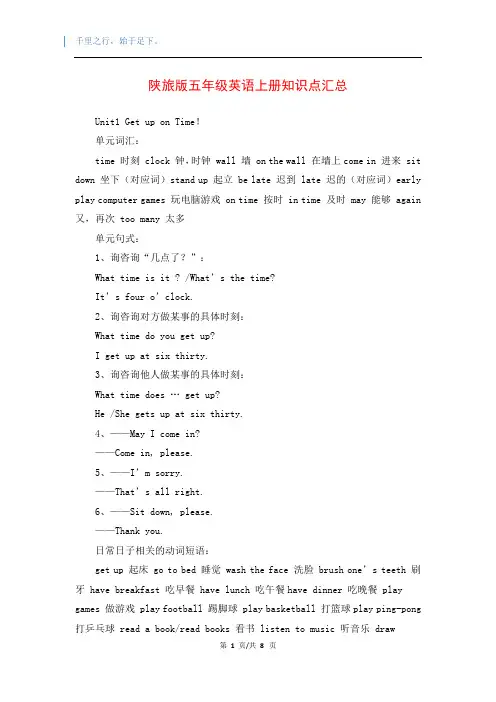
陕旅版五年级英语上册知识点汇总Unit1 Get up on Time!单元词汇:time 时刻 clock 钟,时钟 wall 墙 on the wall 在墙上come in 进来 sit down 坐下(对应词)stand up 起立 be late 迟到 late 迟的(对应词)early play computer games 玩电脑游戏 on time 按时 in time 及时 may 能够 again 又,再次 too many 太多单元句式:1、询咨询“几点了?”:What time is it ? /What’s the t ime?It’s four o’clock.2、询咨询对方做某事的具体时刻:What time do you get up?I get up at six thirty.3、询咨询他人做某事的具体时刻:What time does … get up?He /She gets up at six thirty.4、——May I come in?——Come in, please.5、——I’m sorry.——That’s all right.6、——Sit down, please.——Thank you.日常日子相关的动词短语:get up 起床 go to bed 睡觉 wash the face 洗脸brush one’s teeth 刷牙 have breakfast 吃早餐 have lunch 吃午餐have dinner 吃晚餐 play games 做游戏 play football 踢脚球 play basketball 打篮球play ping-pong 打乒乓球 read a book/read books 看书 listen to music 听音乐 drawpictures /draw a picture画画 fly a kite 放风筝 do exercise 做运动 see a film 看电影 do some washing 洗衣服 do some cooking 做饭do one’s homework 做作业 watch TV 看电视go to school 去上学go home 回家go to work 去上班take photos 拍照片 play the music 播放音乐 sing a song 歌唱 climb the mountain 爬山时刻的相关表达:at eleven o’clock 在11点整 at ten fifty-six 在10:56in the morning 在凌晨 in the afternoon 在下午 in the evening 在晚上 at noon 在中午 at night 在夜里 after class 下课后 after school 放学后拓展:动词第三人称单数的变化规则(和名词变复数规则基本相同)1.普通事情下,直截了当加-s,如:get-gets play-plays like-li kes run-runs jump-jumps dance-dances sing-sings swim-swims2.以s. x. sh. ch. o结尾,加-es,如:guess-guesses, wa sh-washes, watch-watches, go-goes, do-does3.以“辅音字母+y”结尾,变y为i, 再加-es,如:study-st udies4、have-has第三人称单数有he ,she ,it, 人名,your father / mother / grandpa /grandma 等。
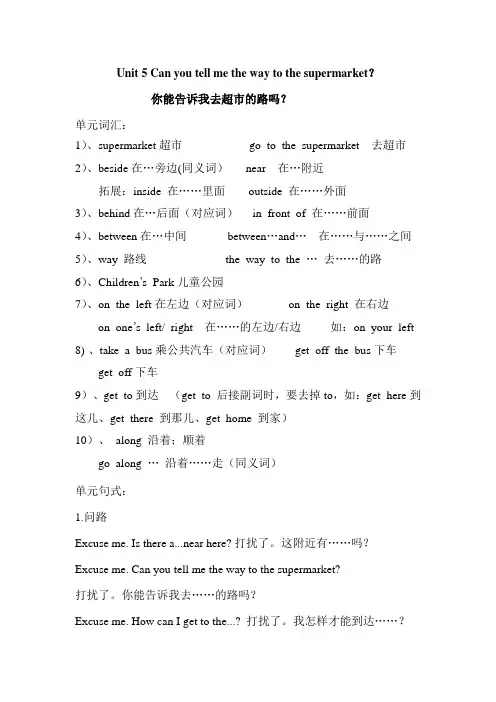
Unit 5 Can you tell me the way to the supermarket?你能告诉我去超市的路吗?单元词汇:1)、supermarket 超市go to the supermarket 去超市2)、beside 在…旁边(同义词)near 在…附近拓展:inside 在……里面outside 在……外面3)、behind 在…后面(对应词) in front of 在……前面4)、between 在…中间between…and…在……与……之间5)、way 路线the way to the …去……的路6)、Children’s Park 儿童公园7)、on the left 在左边(对应词)on the right 在右边on one’s left/ right 在……的左边/右边如:on your left 8)、take a bus 乘公共汽车(对应词)get off the bus下车get off 下车9)、get to 到达(get to 后接副词时,要去掉to,如:get here到这儿、get there 到那儿、get home 到家)10)、along 沿着;顺着go along …沿着……走(同义词)单元句式:1.问路Excuse me. Is there a...near here? 打扰了。
这附近有……吗?Excuse me. Can you tell me the way to the supermarket?打扰了。
你能告诉我去……的路吗?Excuse me. How can I get to the...? 打扰了。
我怎样才能到达……?Excuse me. Where is..., please?打扰了。
请问……在哪里?Excuse me. Which is the way to …, please?打扰了。
请问哪条路通往……?2、指路---Go along the street and you can see a hospital on the left.沿着这条街走,你可以在路左边看到一家医院。
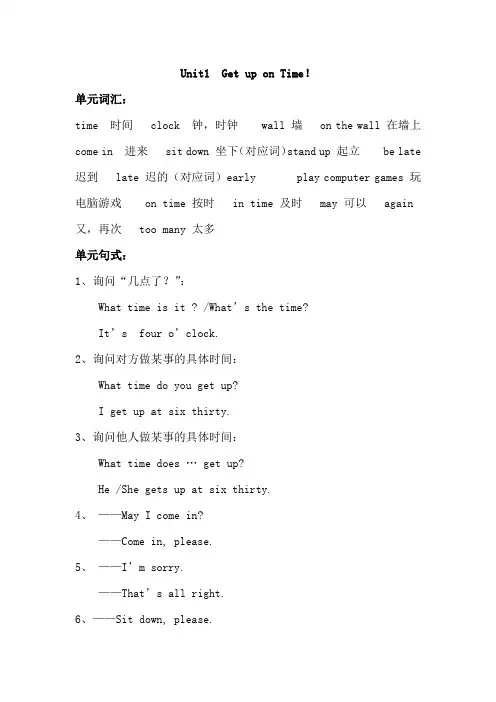
Unit1 Get up on Time!单元词汇:time 时间 clock 钟,时钟 wall 墙 on the wall 在墙上come in 进来 sit down 坐下(对应词)stand up 起立 be late 迟到 late 迟的(对应词)early play computer games 玩电脑游戏 on time 按时 in time 及时 may 可以 again 又,再次 too many 太多单元句式:1、询问“几点了?”:What time is it ? /What’s the time?It’s four o’clock.2、询问对方做某事的具体时间:What time do you get up?I get up at six thirty.3、询问他人做某事的具体时间:What time does … get up?He /She gets up at six thirty.4、——May I come in?——Come in, please.5、——I’m sorry.——That’s all right.6、——Sit down, please.——Thank you.日常生活相关的动词短语:get up 起床 go to bed 睡觉 wash the face 洗脸 brush one’s teeth 刷牙 have breakfast 吃早餐 have lunch 吃午餐have dinner 吃晚餐 play games 做游戏 play football 踢足球 play basketball 打篮球play ping-pong 打乒乓球 read a book/read books 看书 listen to music 听音乐 draw pictures /draw a picture画画 fly a kite 放风筝 do exercise 做运动 see a film 看电影 do some washing 洗衣服 do some cooking 做饭 do one’s homework 做作业 watch TV 看电视go to school 去上学go home 回家go to work 去上班take photos 拍照片 play the music 播放音乐 sing a song 唱歌 climb the mountain 爬山时间的相关表达:at eleven o’clock 在11点整 at ten fifty-six 在10:56in the morning 在早晨 in the afternoon 在下午 in the evening 在晚上 at noon 在中午 at night 在夜里 after class 下课后 after school 放学后拓展:动词第三人称单数的变化规则(和名词变复数规则基本相同)1.一般情况下,直接加-s,如:get-gets play-plays like-li kes run-runs jump-jumps dance-dances sing-sings swim-swims2.以s. x. sh. ch. o结尾,加-es,如:guess-guesses, wa sh-washes, watch-watches, go-goes, do-does3.以“辅音字母+y”结尾,变y为i, 再加-es,如:study-st udies4、have-has第三人称单数有he ,she ,it, 人名,your father / mother / grandpa /grandma 等。
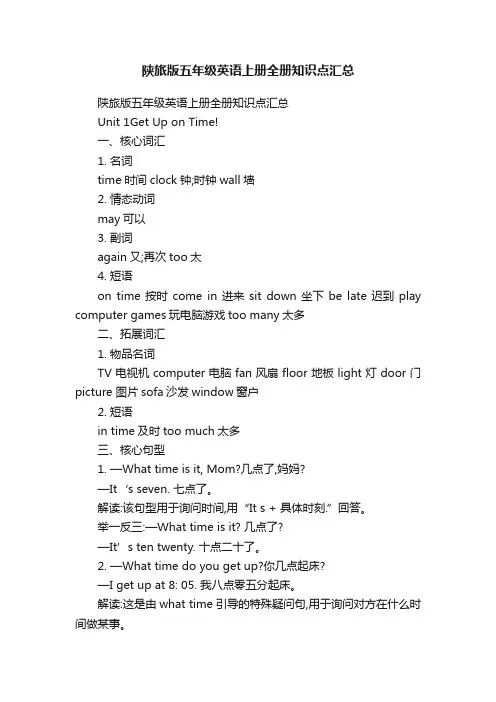
陕旅版五年级英语上册全册知识点汇总陕旅版五年级英语上册全册知识点汇总Unit 1Get Up on Time!一、核心词汇1. 名词time时间clock钟;时钟wall墙2. 情态动词may可以3. 副词again又;再次too太4. 短语on time按时come in进来sit down坐下be late迟到play computer games玩电脑游戏too many太多二、拓展词汇1. 物品名词TV电视机computer电脑fan风扇floor地板light灯door门picture 图片sofa沙发window窗户2. 短语in time及时too much太多三、核心句型1. —What time is it, Mom?几点了,妈妈?—It‘s seven. 七点了。
解读:该句型用于询问时间,用“It s + 具体时刻.”回答。
举一反三:—What time is it? 几点了?—It’s ten twenty. 十点二十了。
2. —What time do you get up?你几点起床?—I get up at 8: 05. 我八点零五分起床。
解读:这是由what time引导的特殊疑问句,用于询问对方在什么时间做某事。
举一反三:—What time do you watch TV?你几点看电视?—I watch TV at 10:00. 我十点看电视。
四、了解句型Get up! 起床了!解读:该句是以动词原形开头的祈使句,祈使句是用于表达请求、命令或劝告等的句子。
举一反三:Go to bed early. 早点上床睡觉。
Unit 2Be Helpful at Home!一、核心词汇1. 动词sweep打扫;清理water给……浇水clean清扫;清洁2. 名词dish盘;餐具meal餐;饭clothes衣服3. 副词sure当然4. 短语make the bed整理床铺sweep the floor扫地do the dishes洗餐具water the flowers浇花clean the windows擦窗户cook the meal做饭wash the clothes 洗衣服二、拓展词汇1. 动词cut 切;割pass传递wash洗cook烹调dry擦干2. 短语of course当然clean the door擦门water the trees浇树dry the dishes 擦干餐具三、核心句型1. —Can you sweep the floor, dear?你能扫地吗,亲爱的?—Yes, of course. 是的,当然。
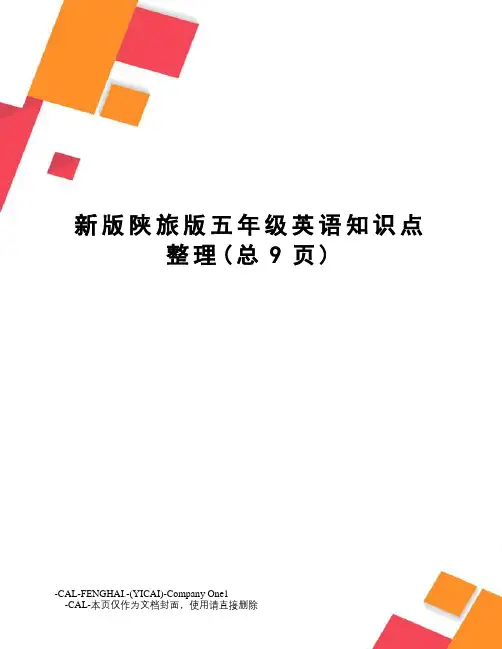
新版陕旅版五年级英语知识点整理(总9页)-CAL-FENGHAI.-(YICAI)-Company One1-CAL-本页仅作为文档封面,使用请直接删除Unit1 How Are You Feeling Now?单词:1、feel感觉;感到2、happy高兴的,快乐的3、 sad悲伤的;难过的,4、tried疲劳的5、angry生气的, 愤怒的6、go out to play出去玩7、snowman雪人 8、make a snowman.堆雪人 9、why为什么 10、because因为11、drink喝 12、make使,让 15、so因此;所以 16、tell告诉短语:1、good idea 好主意2、why not为什么不3、drink some water 喝点水2、4、on time 按时5、come on加油,来吧6、a little一点;少许句子:1.--How are you feeling now你现在感觉怎么样--Because....因为...8.Colin is late again.This makes her very angry.Colin又迟到了,那使她非常生气。
9.So Miss White is telling him to come to school on time and not tobe late again。
因此怀特女士正在告诉他要按时到校,不要迟到。
语法:1、sth makes sb +情绪形容词某事让某人.....Unit 2 Spring is Coming!单词:1、spring,春天2、summer夏天3、 autumn秋天4、 winter冬天5、season季节6、 plant trees植树7、 ride a bike骑自行车8、Tree Planting Day植树节 9、interesting有趣的 10、March 3月11、April四月 12、May五月 13、warm 暖和的 14、hot热的15、go swimming去游泳 16、cool凉爽的 17、rich富有的;丰富的18、cold寒冷的 19、in spring 在春天重点句型:1.--What do you do in季节在...你经常干什么4.--My favorite season is...我最喜欢的季节是....5.Spring is coming!春天到了!4.How happy we are!我们多么高兴啊!5.I plant trees with my parents every year on Tree Planting Day.每年植树节我和父母一块去植树。
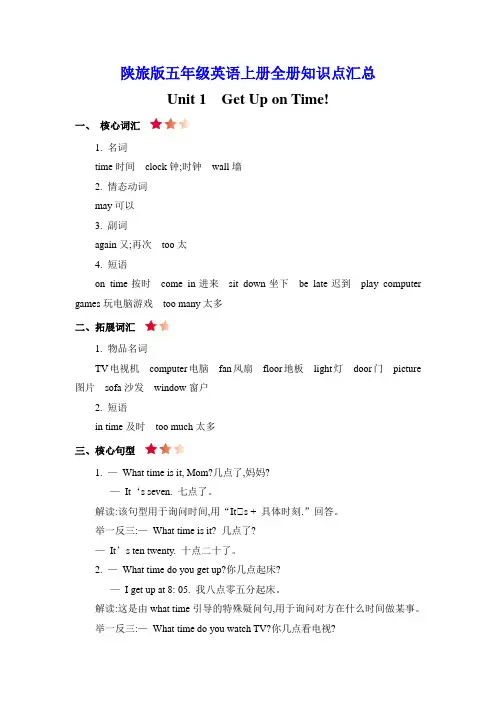
陕旅版五年级英语上册全册知识点汇总Unit 1Get Up on Time!一、核心词汇1. 名词time时间clock钟;时钟wall墙2. 情态动词may可以3. 副词again又;再次too太4. 短语on time按时come in进来sit down坐下be late迟到play computer games玩电脑游戏too many太多二、拓展词汇1. 物品名词TV电视机computer电脑fan风扇floor地板light灯door门picture 图片sofa沙发window窗户2. 短语in time及时too much太多三、核心句型1. —What time is it, Mom?几点了,妈妈?—It‘s seven. 七点了。
解读:该句型用于询问时间,用“It s + 具体时刻.”回答。
举一反三:—What time is it? 几点了?—It’s ten twenty. 十点二十了。
2. —What time do you get up?你几点起床?—I get up at 8: 05. 我八点零五分起床。
解读:这是由what time引导的特殊疑问句,用于询问对方在什么时间做某事。
举一反三:—What time do you watch TV?你几点看电视?—I watch TV at 10:00. 我十点看电视。
四、了解句型Get up! 起床了!解读:该句是以动词原形开头的祈使句,祈使句是用于表达请求、命令或劝告等的句子。
举一反三:Go to bed early. 早点上床睡觉。
Unit 2Be Helpful at Home!一、核心词汇1. 动词sweep打扫;清理water给……浇水clean清扫;清洁2. 名词dish盘;餐具meal餐;饭clothes衣服3. 副词sure当然4. 短语make the bed整理床铺sweep the floor扫地do the dishes洗餐具water the flowers浇花clean the windows擦窗户cook the meal做饭wash the clothes 洗衣服二、拓展词汇1. 动词cut 切;割pass传递wash洗cook烹调dry擦干2. 短语of course当然clean the door擦门water the trees浇树dry the dishes 擦干餐具三、核心句型1. —Can you sweep the floor, dear?你能扫地吗,亲爱的?—Yes, of course. 是的,当然。
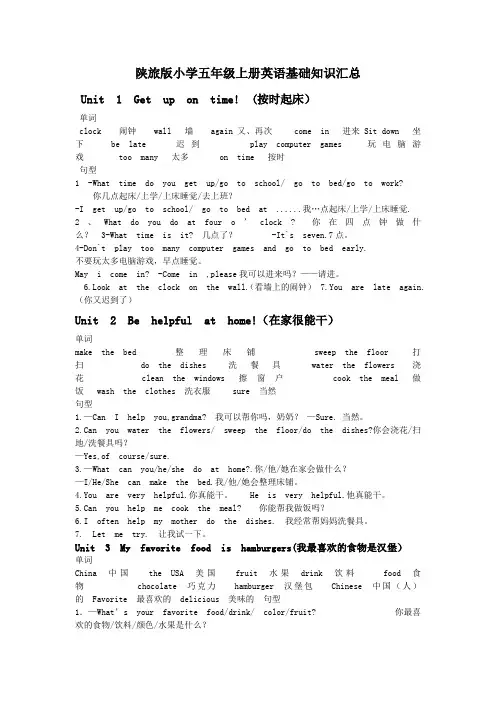
陕旅版小学五年级上册英语基础知识汇总Unit 1 Get up on time! (按时起床)单词clock 闹钟 wall 墙 again 又、再次come in 进来 Sit down 坐下be late 迟到play computer games 玩电脑游戏 too many 太多 on time 按时句型1 -What time do you get up/go to school/ go to bed/go to work?你几点起床/上学/上床睡觉/去上班?-I get up/go to school/ go to bed at ......我…点起床/上学/上床睡觉. 2、What do you do at four o’clock ? 你在四点钟做什么?3-What time is it? 几点了?-It`s seven.7点。
4-Don`t play too many computer games and go to bed early.不要玩太多电脑游戏,早点睡觉。
May i come in? -Come in ,please我可以进来吗?——请进。
6.Look at the clock on the wall.(看墙上的闹钟)7.You are late again.(你又迟到了)Unit 2 Be helpful at home!(在家很能干)单词make the bed 整理床铺sweep the floor 打扫do the dishes 洗餐具water the flowers浇花clean the windows擦窗户cook the meal 做饭wash the clothes 洗衣服sure 当然句型1.—Can I help you,grandma? 我可以帮你吗,奶奶?—Sure. 当然。
2.Can you water the flowers/ sweep the floor/do the dishes?你会浇花/扫地/洗餐具吗?—Yes,of course/sure.3.—What can you/he/she do at home?.你/他/她在家会做什么?—I/He/She can make the bed.我/他/她会整理床铺。
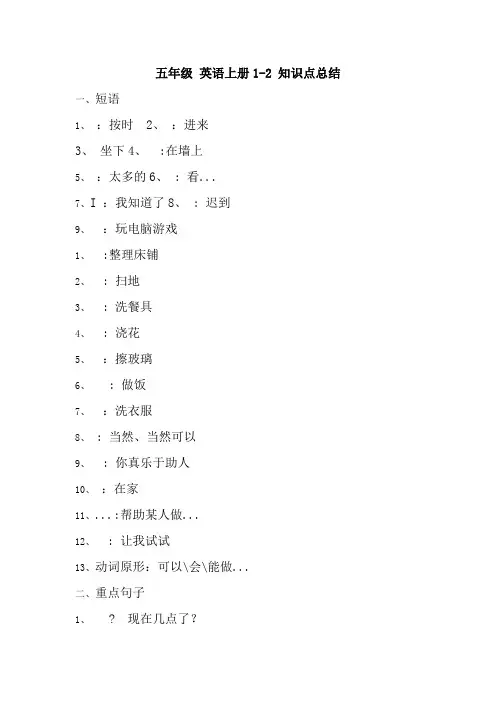
五年级英语上册1-2 知识点总结一、短语1、:按时2、:进来3、坐下4、 :在墙上5、:太多的6、 : 看...7、I :我知道了8、 : 迟到9、:玩电脑游戏1、 :整理床铺2、 : 扫地3、 : 洗餐具4、 : 浇花5、:擦玻璃6、 : 做饭7、:洗衣服8、 : 当然、当然可以9、 : 你真乐于助人10、:在家11、...:帮助某人做...12、 : 让我试试13、动词原形:可以\会\能做...二、重点句子1、 ? 现在几点了?答: 's +时间:现在...2、 I ? 我可以进来吗?答:,。
请进。
3、I'm 。
对不起。
答:’s 。
没关系。
4、 .你又迟到了。
5、 ...?你几点...?时间:我在...点......6、’t.别玩太多电脑游戏并早点休息。
1. I ?我可以帮你吗?I ?我能为你做点什么吗?答:\, ...?当然,你能...?2 ( ). 你真乐于助人。
3. ?你在家会做什么?答:I ......我会做.......4. I .我经常帮助我妈妈洗餐具。
(动词原形):帮助...做...5. .让我试试吧。
6. \\ : 当然\好的\可以三、重点知识点1、 ?现在几点了?答:'时间。
(时间前不用)\ ?答:... (时间前必须用)2、I . 我明白了\我知道了。
3、 ...: 看... (介词用)4、 : 在墙上 (介词用)5、 : 太多的 (修饰名词复数)6、 : (情态动词) 能\会\可以...(后跟动词原形)7、(\\) : 乐于助人...四、自己补充3 4 单元复习知识点一、重点单词及词组:1、中国2、美国3、水果4、喝5、食物6、巧克力 7、汉堡包 8、最喜欢的9、经常 10、美味的11、中餐12、喝下午茶 13、桌子 14、勺子15、切 16、小刀 17、筷子 18、使用19、叉子 20、递 21、吃饭 22、不是那样23、.给你 24、当然25、...想要做某事 26、I 我知道了,我明白了。
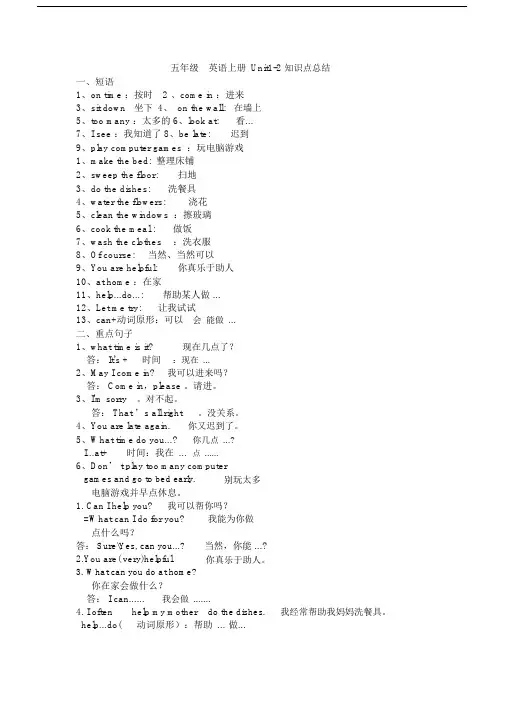
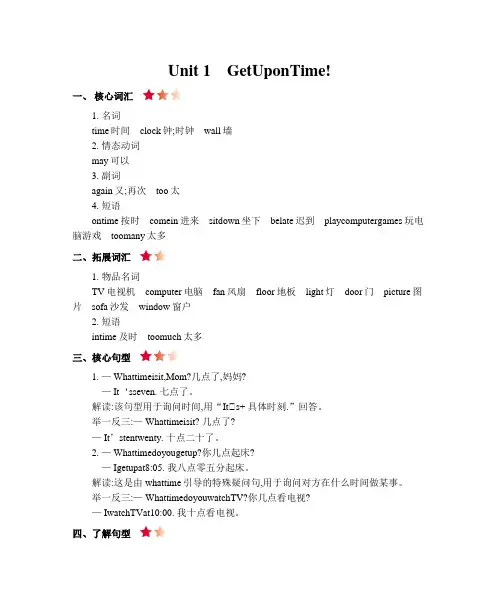
Unit 1GetUponTime!一、核心词汇1. 名词time时间clock钟;时钟wall墙2. 情态动词may可以3. 副词again又;再次too太4. 短语ontime按时comein进来sitdown坐下belate迟到playcomputergames玩电脑游戏toomany太多二、拓展词汇1. 物品名词TV电视机computer电脑fan风扇floor地板light灯door门picture图片sofa沙发window窗户2. 短语intime及时toomuch太多三、核心句型1. — Whattimeisit,Mom?几点了,妈妈?— It‘sseven. 七点了。
解读:该句型用于询问时间,用“It s+ 具体时刻.”回答。
举一反三:— Whattimeisit? 几点了?— It’stentwenty. 十点二十了。
2. — Whattimedoyougetup?你几点起床?— Igetupat8:05. 我八点零五分起床。
解读:这是由whattime引导的特殊疑问句,用于询问对方在什么时间做某事。
举一反三:— WhattimedoyouwatchTV?你几点看电视?— IwatchTVat10:00. 我十点看电视。
四、了解句型Getup! 起床了!解读:该句是以动词原形开头的祈使句,祈使句是用于表达请求、命令或劝告等的句子。
举一反三:Gotobedearly. 早点上床睡觉。
Unit 2BeHelpfulatHome!一、核心词汇1. 动词sweep打扫;清理water给……浇水clean清扫;清洁2. 名词dish盘;餐具meal餐;饭clothes衣服3. 副词sure当然4. 短语makethebed整理床铺sweepthefloor扫地dothedishes洗餐具watertheflowers 浇花cleanthewindows擦窗户cookthemeal做饭washtheclothes洗衣服二、拓展词汇1. 动词cut 切;割pass传递wash洗cook烹调dry擦干2. 短语ofcourse当然cleanthedoor擦门waterthetrees浇树drythedishes 擦干餐具三、核心句型1. — Canyousweepthefloor,dear?你能扫地吗,亲爱的?— Yes,ofcourse. 是的,当然。
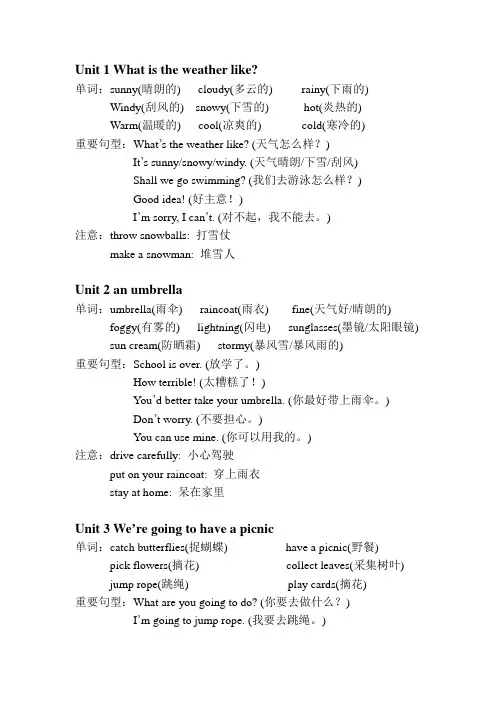
Unit 1 What is the weather like?单词:sunny(晴朗的) cloudy(多云的) rainy(下雨的) Windy(刮风的) snowy(下雪的) hot(炎热的)Warm(温暖的) cool(凉爽的) cold(寒冷的)重要句型:What’s the weather like? (天气怎么样?)It’s sunny/snowy/windy. (天气晴朗/下雪/刮风)Shall we go swimming? (我们去游泳怎么样?)Good idea! (好主意!)I’m sorry, I can’t. (对不起,我不能去。
)注意:throw snowballs: 打雪仗make a snowman: 堆雪人Unit 2 an umbrella单词:umbrella(雨伞) raincoat(雨衣) fine(天气好/晴朗的) foggy(有雾的) lightning(闪电) sunglasses(墨镜/太阳眼镜)sun cream(防晒霜) stormy(暴风雪/暴风雨的)重要句型:School is over. (放学了。
)How terrible! (太糟糕了!)You’d better take your umbrella. (你最好带上雨伞。
)Don’t worry. (不要担心。
)You can use mine. (你可以用我的。
)注意:drive carefully: 小心驾驶put on your raincoat: 穿上雨衣stay at home: 呆在家里Unit 3 We’re going to have a picnic单词:catch butterflies(捉蝴蝶) have a picnic(野餐) pick flowers(摘花) collect leaves(采集树叶)jump rope(跳绳) play cards(摘花)重要句型:What are you going to do? (你要去做什么?)I’m going to jump rope. (我要去跳绳。
【陕旅版】五年级(上册)英语:知识点总结unit 1 知识点单词clock 闹钟wall 墙again 又、再次come in 进来Sitdown 坐下be late 迟到play computer games 玩电脑游戏too many 太多on time 按时句型1、-What time do you get up/go to school/ go to bed/go to work?你几点起床/上学/上床睡觉/去上班?-I get up/go to school/ go to bed at ......我…点起床/上学/上床睡觉.2、What do you do at four o’clock ? 你在四点钟做什么?3、-What time is it? 几点了?-It`s seven. 7点。
4、Don`t play too many computer games and go to bed early.不要玩太多电脑游戏,早点睡觉。
5、-May i come in? 我可以进来吗?-Come in ,please 请进。
第 1 / 9 页6、Look at the clock on the wall.(看墙上的闹钟)7、You are late again.(你又迟到了)unit 2 知识点单词make the bed 整理床铺sweep the floor 打扫do the dishes 洗餐具water the flowers浇花clean the windows擦窗户cook the meal 做饭wash the clothes 洗衣服sure 当然句型1、—Can I help you,grandma? 我可以帮你吗,奶奶?—Sure. 当然。
2、—Can you water the flowers/ sweep the floor/do the dishes?你会浇花/扫地/洗餐具吗?—Yes,of course/sure. 是的,当然。
五年级英语上册知识点总结Unit 1 Get up on time! (按时起床)一、短语1、on time:按时2、come in:进来3、sit down坐下4、on the wall:在墙上5、too many:太多的6、look at: 看...7、I see:我知道了8、be late: 迟到9、play computer games:玩电脑游戏10. clock 闹钟11.wall 墙12.again又、再次13. What time…什么时间,问具体时间二、重点句子:1、what time is it? 现在几点了?答: It's +时间:现在...例:What time is it?(几点了?)It’s seven o’clock.(七点了。
)2、What time do you...?你几点...? I...at+时间:我在...点......例:(1)What time do you get up/go to school/ go to bed/go to work?你几点起床/上学/上床睡觉/去上班?I get up/go to school/ go to bed at .....(.我…点起床/上学/上床睡觉. )(2)What time do you get up?(你几点起床?) I get up at 8:05.(我八点过五分起床。
) (3) What time do you go to bed?(你几点睡觉?)I go to bed at 11:15.(我十一点十五分睡觉。
)(4) What time does she go to school?(她几点去学校?)She goes to school at eight o’clock.(她八点去学校。
)(5) What time does he go to work?(他几点去上班?)He goes to work at eight twenty.(他八点二十去上班。
Unit 1GetUponTime!一、核心词汇1. 名词time时间clock钟;时钟wall墙2. 情态动词may可以3. 副词again又;再次too太4. 短语ontime按时comein进来sitdown坐下belate迟到playcomputergames玩电脑游戏toomany太多二、拓展词汇1. 物品名词TV电视机computer电脑fan风扇floor地板light灯door门picture图片sofa沙发window窗户2. 短语intime及时toomuch太多三、核心句型1. — Whattimeisit,Mom?几点了,妈妈?— It‘sseven. 七点了。
解读:该句型用于询问时间,用“It s+ 具体时刻.”回答。
举一反三:— Whattimeisit? 几点了?— It’stentwenty. 十点二十了。
2. — Whattimedoyougetup?你几点起床?— Igetupat8:05. 我八点零五分起床。
解读:这是由whattime引导的特殊疑问句,用于询问对方在什么时间做某事。
举一反三:— WhattimedoyouwatchTV?你几点看电视?— IwatchTVat10:00. 我十点看电视。
四、了解句型Getup! 起床了!解读:该句是以动词原形开头的祈使句,祈使句是用于表达请求、命令或劝告等的句子。
举一反三:Gotobedearly. 早点上床睡觉。
Unit 2BeHelpfulatHome!一、核心词汇1. 动词sweep打扫;清理water给……浇水clean清扫;清洁2. 名词dish盘;餐具meal餐;饭clothes衣服3. 副词sure当然4. 短语makethebed整理床铺sweepthefloor扫地dothedishes洗餐具watertheflowers 浇花cleanthewindows擦窗户cookthemeal做饭washtheclothes洗衣服二、拓展词汇1. 动词cut 切;割pass传递wash洗cook烹调dry擦干2. 短语ofcourse当然cleanthedoor擦门waterthetrees浇树drythedishes 擦干餐具三、核心句型1. — Canyousweepthefloor,dear?你能扫地吗,亲爱的?— Yes,ofcourse. 是的,当然。
一、数字1 – one2 – two3 – three4 – four5 – five6 – six7 - seven8 –eight9 – nine 10 – ten 11 – eleven12 – twelve 13 - thirteen14 – fourteen 15 – fifteen16 – sixteen 17 - seventeen18 – eighteen 19 – nineteen20 - twenty30 – thirty 40 – forty 50 – fifty 60 – sixty 70 - seventy80 –eighty 90 – ninety 100 - one hundredX二、元音字母及其组合的发音规律开音节1)以发音的元音字母结尾的单节。
例:be,he。
2)以辅音字母(r 除外)+不发音的e结尾的音节。
例:make,like。
闭音节以一个或几个辅音字母(r 除外)结尾而中间只有一个元音字母的音节,1.a在开音节中a读 / ei/ 在闭音节中a读 / ? /2.e在开音节中读/ i: / e在闭音节中读/ e /3.i,y 在开音节中读/ ai / i,y在闭音节中读/ I /4.o在开音节中读 [?u ] o在闭音节中/?/5.u在开音节中读[ ju: ] u在闭音节中/Λ/三、英语缩写形式及完全形式I’m = I am you’re = you are he’s = he isisn’t = is not aren’t = are notI’ll = I wil we’ll = we wilI’ve got= I have got let’s= let usdoesn’t=does not can’t= can not I’d=I would。
Unit 1Get Up on Time!一、核心词汇1. 名词time时间clock钟;时钟wall墙2. 情态动词may可以3. 副词again又;再次too太4. 短语on time按时come in进来sit down坐下be late迟到play computer games玩电脑游戏too many太多二、拓展词汇1. 物品名词TV电视机computer电脑fan风扇floor地板light灯door门picture图片sofa沙发window窗户2. 短语in time及时too much太多三、核心句型1. —What time is it, Mom?几点了,妈妈?—It‘s seven. 七点了。
解读:该句型用于询问时间,用“It s + 具体时刻.”回答。
举一反三:—What time is it? 几点了?—It’s ten twenty. 十点二十了。
2. —What time do you get up?你几点起床?—I get up at 8: 05. 我八点零五分起床。
解读:这是由what time引导的特殊疑问句,用于询问对方在什么时间做某事。
举一反三:—What time do you watch TV?你几点看电视?—I watch TV at 10:00. 我十点看电视。
四、了解句型Get up! 起床了!解读:该句是以动词原形开头的祈使句,祈使句是用于表达请求、命令或劝告等的句子。
举一反三:Go to bed early. 早点上床睡觉。
Unit 2Be Helpful at Home!一、核心词汇1. 动词sweep打扫;清理water给……浇水clean清扫;清洁2. 名词dish盘;餐具meal餐;饭clothes衣服3. 副词sure当然4. 短语make the bed整理床铺sweep the floor扫地do the dishes洗餐具water the flowers浇花clean the windows擦窗户cook the meal做饭wash the clothes洗衣服二、拓展词汇1. 动词cut 切;割pass传递wash洗cook烹调dry擦干2. 短语of course当然clean the door擦门water the trees浇树dry the dishes 擦干餐具三、核心句型1. —Can you sweep the floor, dear?你能扫地吗,亲爱的?—Yes, of course. 是的,当然。
陕旅版英语五年级知识点总结帮助孩子复习的利器英语上册Unit1-2知识点总结一、重点单词及词组1、on time:按时2、come in:进来3、sit down坐下4、on the wall:在墙上5、too many:太多的6、look at:看...7、I see:我知道了8、be late:迟到9、play computer games:玩电脑游戏10、make the bed:整理床铺11、sweep the floor:扫地12、do the dishes:洗餐具13、water the flowers:浇花14、clean the windows:擦玻璃15、cook the meal:做饭16、wash the clothes:洗衣服17、Of course:当然、当然可以18、You are helpful:你真乐于助人19、at home:在家20、help...do...:帮助某人做...21、Let me try:让我试试22、can+动词原形:可以会能做...二、重点句子1、what time is it?现在几点了?答:It's+时间:现在...2、May I come in?我可以进来吗?答:Come in,please。
请进。
3、I'm sorry。
对不起。
答:That’s all right。
没关系。
4、You are late again.你又迟到了。
5、What time do you...?你几点...?I...at+时间:我在...点......6、Don’t play too many computer games and go to bed early.别玩太多电脑游戏并早点休息。
7.Can I help you?我可以帮你吗?=What can I do for you?我能为你做点什么吗?答:SureYes,can you...?当然,你能...?8.You are(very)helpful.你真乐于助人。
Unit1 Get Up on Time!一、单元单词(12个)·time[taɪm] / n.时间What time is it?(几点了?)·on time[ɔn taim] / 按时We can certainly have the job finished on time.(我们肯定能按时完成任务。
) ·clock[klɒk] / n.钟;时钟It's a large clock.(这是一个大钟。
)·wall[wɔ:l] / n.墙This wall is made up of oddly shaped bricks.(这道墙由形状不规则的砖砌成。
) ·come in[kʌm in] / 进来May I come in?(我可以进来吗?)·sit down[sit daun] / 坐下Sit down, kids. Put on your glasses.(坐下,孩子们。
戴上你们的眼镜。
)·be late[bi: leit] / 迟到Nobody is allowed to be late.(任何人不得迟到。
)·play computer games/ 玩电脑游戏Bill likes playing computer games.(比尔喜欢玩电脑游戏。
)·may[meɪ] / aux.可以We like May,because we can have many days-off.(我喜欢五月,因为可以有很多假期。
)·again[əˈgen] / adv.又;再次Nice to see you again.(很高兴再次见到你。
)·too[tu:] / adv.太The box is too small for him to sit in.(这个盒子太小了,它坐不下。
)·too many[tu: ˈmeni] / 太多It's a trap too many people fall into.(太多人都掉进了这个陷阱中。
)二、重点句子Mom: Get up, Colin! Get up!妈妈:起床,科林!起床!Colin: What time is it, Mom?科林:几点了,妈妈?Mom: It’s seven.妈妈:七点了。
Colin: Oh, I see.科林:哦,我知道了。
Colin: May I come in?科林:我可以进来吗?Miss White: Come in, please. Look at the clock on the wall. It’ s eight twenty, Colin. You are late.怀特老师:请进。
看墙上的时钟。
现在八点二十了,科林。
你迟到了。
Colin: I’m sorry.科林:对不起。
Miss White: That’s all right. Sit down, please.怀特老师:没关系。
请坐。
Colin: Thank you.科林:谢谢你。
Miss White: You are late again, Colin. Look! It’s 8:30.怀特老师:你又迟到了,科林。
看!现在八点半了。
Colin: I’m sorry, Miss White.科林:对不起,怀特老师。
Miss White: What time do you get up?怀特老师:你几点起床?Colin: I get up at 8:05.科林:我在八点零五分起床。
Miss White: What time do you go to bed, then?怀特老师:那么你几点上床睡觉?Colin: I go to bed at 11:15.科林:我在十一点十五分上床睡觉。
Miss White: Don’t play too many computer games and go to bed early.怀特老师:不要玩太多电脑游戏,早点儿睡觉。
Colin: OK.科林:好的。
Unit 2 Be Helpful at Home!一、单元单词(14个)·make the bed[meik ðə bed] / v.整理床铺I had her make the bed.(我让她把床铺整理好了。
)·sweep[swi:p] / vt.打扫;清理The owner of the store was sweeping his floor.(店主正在扫地。
) ·sweep the floor[swi:p ðə flɔ:] / 扫地It's my turn to sweep the floor.(该轮到我打扫地板了。
)·dish[dɪʃ] / n.盘;餐具This dish tastes good.(这盘菜的滋味不错。
)·do the dishes/ 洗餐具I cooked the dinner so you can do the dishes.(我烧了饭,所以你可以洗碟子。
) ·water[ˈwɔ:tə(r)] / v.给······浇水Do you want water?(你想喝水吗?)·water the flowers/ 浇花I need to water the flowers every day.(我需要每天给花浇水。
)·clean[kli:n] / vi.清扫;清洁She got up early and cleaned the flat.(她早早就起了床,把公寓打扫干净。
) ·clean the windows/ 擦窗户We clean the windows every day.(我们每天都擦窗户。
)·meal[mi:l] / n.餐;饭I feel like a meal.(我想吃饭。
)·cook the meal/ 做饭The cook hurried the meal.(炊事员赶快做好了饭。
)·clothes[kləʊðz] / n.衣服I have already started knitting baby clothes.(我已经开始给宝宝织衣服了。
) ·wash the clothes/ 洗衣服Can you wash the clothes?(你会洗衣服吗?)·sure[ʃʊə(r)] / adv.当然Your want me to call him?Sure,I can do that!(你想让我给他打电话么?当然,我能做到!)二、重点句子:Li Shan: Can I help you, Grandma?李珊:我能帮助你吗,(外)祖母?Grandma: Sure. Can you sweep the floor, dear?(外)祖母:当然。
你能扫地吗,亲爱的?Li Shan: Yes, of course.李珊:是的,当然。
Grandma: Thank you, dear.(外)祖母:谢谢你,亲爱的。
Li Shan: What can I do for you, Grandpa?李珊:我能为你做点儿什么,(外)祖父?Grandpa: Can you water the flowers, please?(外)祖父:请问你能浇花吗?Li Shan: OK.李珊:好的。
Grandpa: Good girl! You are helpful.(外)祖父:好孩子!你真能干。
Aunt: What can you do at home, Shanshan?阿姨:你在家能做什么,珊珊?Li Shan: I can make the bed.李珊:我能整理床铺。
Aunt: Can you do the dishes?阿姨:你能洗餐具吗?Li Shan: Yes. I often help my mother do the dishes.李珊:是的。
我经常帮助我妈妈洗餐具。
Aunt: Can you help me cook the meal?阿姨:你能帮助我做饭吗?Li Shan: Let me try.李珊:让我试一试。
Aunt: Great! You are very helpful.阿姨:太好了!你非常乐于助人。
Every Day每天Every day I get up, make the bed, sweep the floor.每天我起床,整理床铺,扫地。
Every day I do this and that at seven in the morning.每天我在早上七点做这个和那个。
Every day I wash the clothes, clean the windows,每天我洗衣服,擦窗户,Water the flowers.浇花。
Every day I do this and that at five in the afternoon.每天我在下午五点做这个和那个。
Every day we cook the food, have dinner,每天我们烹饪食物,吃晚饭,Do the dishes.洗餐具。
Every day we do this and that at seven together.每天我们一起在七点做这个和那个。
Unit 3 My Favorite Food Is Hamburgers 二、单元单词(13个)·favorite['feɪvərɪt] / n.最喜欢的;最喜欢的人或物Gym is his favorite sport.(体操是他最喜爱的运动。
)·food[fu:d] / n.食物I thought the food was very tasty.(我觉得这食物很可口。
)·hamburger[ˈhæmbɜ:gə(r)] / n.汉堡Hamburger is unhealthy but delicious.(汉堡虽不健康但好吃。
)·China['tʃaɪnə] / n.中国I'm from the China.(我来自中国。
)·the USA/ 美国I'm from the USA.(我来自美国。
)·fruit[fru:t] / n.水果I want some fruit.(我想要一些水果。